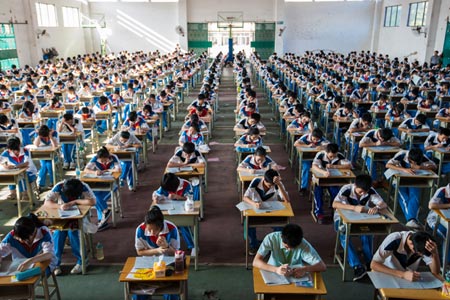Gaokao is a standardized test used by the nation as a college entrance examination. The equivalent to SATs for Americans, the Gaokao exam determines Chinese students educational future. The exam is held once a year at the end of the school year. Currently the exam focuses on Chinese language and literature, mathematics and a foreign language - often English.
However The Ministry of Education released a reform proposal for excluding English as mandatory subject in the exam.
The plan, which was released by the ministry on Friday, said English will not be a gaokao test subject in the future. Instead, students can take English tests more than once each year, and only the highest score will be counted. They plan to have the English section of the Gaokao reduced from 150 points to 100, and Chinese section increased from 150 to 180.
The change has been been well received from students but also triggered heated debates.
Tang Shengchang, an expert with the national education and examination steering committee, said the reform will offer students more chances, and exclude accidental factors in examinations. "A one-time examination usually can't reflect a student's real level, and it's a kind of unfairness to students," he said. "But after several tests, I think, the English level of students can be tested in a more accurate way."
Removing English as a Gaokao subject will allow students to work on other areas of their overall education, like their practical communication skills.
Liu Limin, vice-minister of education, said the new policy would help diversify the traditional evaluation of English skills.
Xinhua called the proposals "no more than a minor tweak", emphasizing that they would change the way that English is taught without diminishing its importance.
However, parents still have concerns over the decision to exclude English. "English is so important for children, and I will urge my son to study it hard no matter how the gaokao is reformed,” said Shen Aimei, mother of a primary school student in Beijing.













